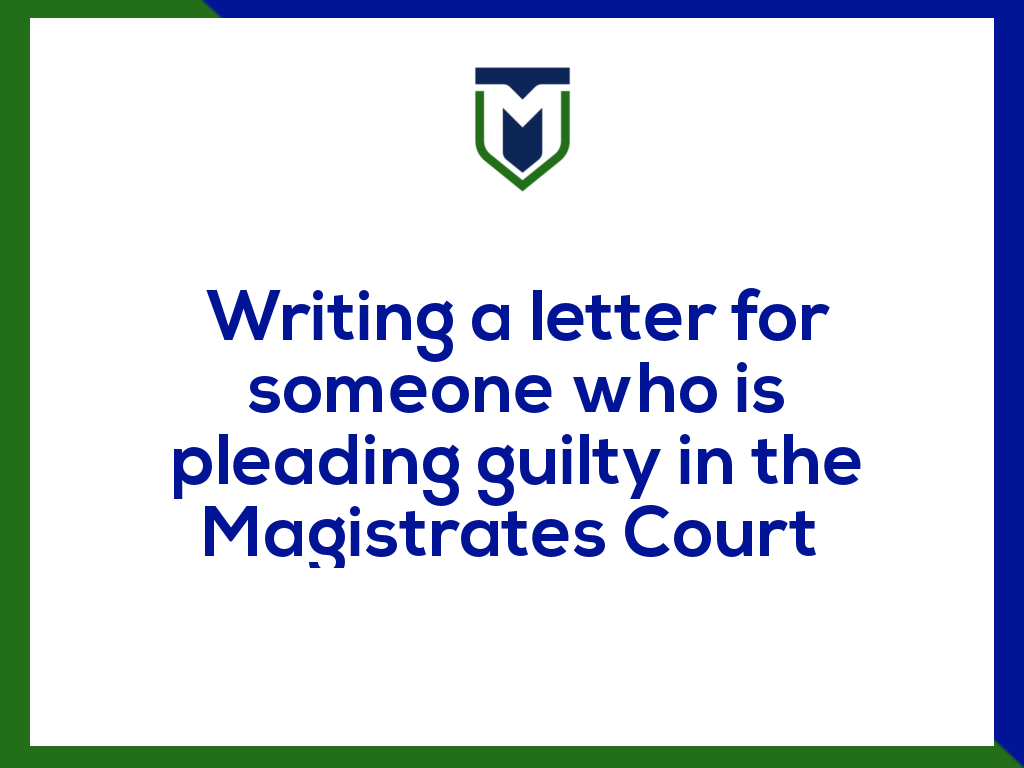

Writing a letter of remorse for sentencing
Remorse can be seen as a deep regret and repentance for a wrong committed. Letters of remorse can be tendered to the court at your sentencing to show the court you have insight into your behaviour and the impact it has on others.
How to write a letter of remorse
Before making submissions as to how remorse should mitigate the penalty, be cautious to ensure what is being tendered or demonstrated to show the remorse it not just self-pity, or a self-centred determination to put the offending in the past and move on.
When writing a letter of remorse or apology, in addition to the other formalities such as types, dated, signed and addressed to the “Presiding Magistrate/Judge” consider the following:
- Take full responsibility, do not try and defend your actions or shift blame elsewhere. The first instinct may be to explain the reasoning or forces behind the behaviour, resist these temptations as it reduces the authenticity of your letter;
- Think about who has suffered as a consequence of the behaviour, consider how they may feel and what they may be going through as a result. Talk about how it makes you feel to know you have caused this; and
- Outline any steps you have taken or intend to take to address the harm caused.
It is important that you have the first attempt at writing a letter of remorse, as having a lawyer write the letter the first time will come off as being obviously written by a lawyer (lessening the genuine nature of the letter). However, should you absolutely supply a draft to your lawyer to ensure nothing has been missed or could be added to ensure your remorse is shown properly.
It can be tempting to attempt to demonstrate remorse through discussing how the offending has seen a period of incarceration, employment, removal from family or an otherwise negative impacts on your circumstances.
The impact of the offending on you should not be addressed in the letter of remorse. Instead, the letter should focus on who has been hurt, insight into how the actions have adversely impacted them and how it makes the you feel to know they have caused other people harm or injury by their behaviour.
What your lawyer will do you with your letter of remorse
Your lawyer might hand it up to the court on the day of sentencing, or even provide it to the police to pass it on to the victims.
The Court in R v O’Sullivan; Ex parte Attorney-General (Qld); R v Lee; Ex parte Attorney-General (Qld) [2019] QCA 300 at paragraphs 127 – 130 discussed the impact of remorse and sentencing factors. The factors were reiterated in R v Ruiz; Ex parte Attorney-General (Qld) [2020] QCA 72.
Genuine remorse can result in a sentencing court giving less weight to specific deterrence as a factor in crafting the sentence. Someone who has committed the offence and has insight and understanding as to why it was wrong may be regarded as less likely to reoffend than somebody who likes the insight and remorse. Where remorse has been demonstrated, that person is not in need of additional punishment to serve as personal deterrence for future offending.
Genuine remorse may also mitigate the weight to be given to the denunciations factor. There may not be as much of a need the punishment to act for denunciations in the case of a person has demonstrated contrition which the community can accept as genuine.
No evidence of remorse does not amount to a lack of remorse, it merely remains a neutral consideration per Sofronoff P in R v Anthony [2020] QCA 79.


